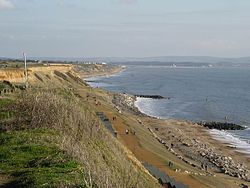Barton on Sea
| Barton on Sea | |
|---|---|
 Cliffs at Barton on Sea |
|
| Barton on Sea shown within Hampshire | |
| Population | 5,454 (2011.ward) |
| OS grid reference | SZ244937 |
| District | |
| Shire county | |
| Region | |
| Country | England |
| Sovereign state | United Kingdom |
| Post town | New Milton |
| Postcode district | BH25 7 |
| Dialling code | 01425 |
| Police | Hampshire |
| Fire | Hampshire |
| Ambulance | South Central |
| EU Parliament | South East England |
| UK Parliament | |
Barton on Sea (often hyphenated as Barton-on-Sea) is a coastal village situated in Hampshire, England. As a settlement, Barton has a history dating back to Anglo-Saxon times, although the modern village was largely built in the 20th century. It is effectively a suburb of New Milton. Barton is notable for the many fossils to be found in the Barton geological beds in the cliffs, as well as for the significant sea defences built to defend the cliffs against coastal erosion.
The area of Barton has been populated since prehistoric times. A number of bronze age funerary urns were uncovered in Barton during the early 20th century, although most of them have been lost or destroyed. While Barton is a common English place-name, the etymology of Barton-on-Sea is unique. It means Beorma's Farm, and appears twice in the Domesday Book, as Bermintune and as Burmintune.Roger de Montgomerie, 1st Earl of Shrewsbury, and friend of William the Conqueror, held both Barton manors in 1086.
A manor is mentioned in 1559, when John Dowce died in possession of it. William Juniper acquired it soon after, and at his death it was described as the capital farm called "Barmeton". In 1654, Richard Stephens, lord of Winkton Manor, is said to have owned the "site of the manor" of Barton. It remained in the Stephens family until 1733, when Richard Stephens sold it to Thomas Le Marchant of the Inner Temple. In 1771 John Le Marchant of Guernsey conveyed "the scite of the manor of Barton, etc.," to Edward Dampier of Corfe Castle, in whose family it remained (the last holder having taken the name of Crossley) until 1903. A distinctive row of Coast Guard Cottages is to be found in Barton Lane, Barton on Sea; these were built at the end of the nineteenth century by the Government of the day to house armed guards to try to stop the smuggling that was rife at the time. The Barton on Sea and Mudeford coastline was renowned for smuggling with many of the offshore seaways and routes to shore being named after well known local smuggling families.
...
Wikipedia

